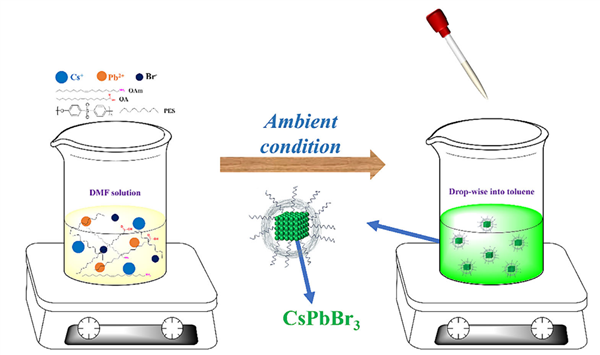Highly luminescent and stable CsPbBr3 perovskite nanocrystals coated with polyethersulfone for white light-emitting diode applications
writer:Hao Zhang, Xuemei Wang, Ning Ai, Jianli Wang
keywords:defect passivation, perovskite nanocrystal, photoluminescence, polyethersulfone, stability
source:期刊
specific source:Luminescence.
Issue time:2024年
同時提高無機鈣鈦礦納米晶體(NCs)的穩(wěn)定性和光致發(fā)光量子產率(PLQY)對其在各種光電器件中的實際應用至關重要�。本文采用原位共沉淀法制備了聚醚砜(PES)包覆CsPbBr3 NCs。PES中的砜基團與CsPbBr3 NCs上的欠配位鉛離子(Pb2+)結合����,顯著減少了表面缺陷,從而將PLQY從74.2%提高到88.3%�。同時,pes包覆的NCs具有較高的耐水性和優(yōu)異的熱穩(wěn)定性和光穩(wěn)定性���,在熱老化(70℃��,4 h)和連續(xù)365 nm紫外(UV)光照射(24 W, 8 h)條件下保持了初始PL強度的85%以上�����。相比之下����,對照 NCs 的PL強度急劇下降到40%以下。最后�,利用PES包覆的CsPbBr3 NCs制備了發(fā)光白光的二極管,其色域達到NTSC標準的110%����。
Simultaneously improving the stability and photoluminescence quantum yield (PLQY) of all inorganic perovskite nanocrystals (NCs) is crucial for their practical utilization in various optoelectronic devices. Here, CsPbBr3 NCs coated with polyethersulfone (PES) were prepared via an in-situ co-precipitation method. The sulfone groups in PES bind to undercoordinated lead ion (Pb2+) on the CsPbBr3 NCs, resulting in significant reduction of surface defects, thus enhancing the PLQY from 74.2% to 88.3%. Meanwhile, the PES-coated NCs exhibit high water resistance and excellent heat and light stability, maintaining over 85% of the initial PL intensity under thermal aging (70℃, 4 h) and continuous 365 nm ultraviolet (UV) light irradiation (24 W, 8 h) conditions. By contrast, the PL intensity of the control NCs dramatically dropped to less than 40%. Finally, a diode emitting bright white light was fabricated utilizing the PEScoated CsPbBr3 NCs, which exhibits a color gamut of ~110% NTSC standard.

國家自然科學基金(資助號:22109138和22178317)資助。
https://doi.org/10.1002/bio.4734